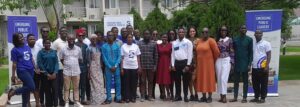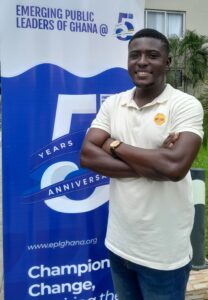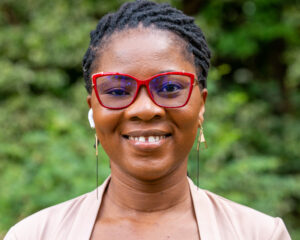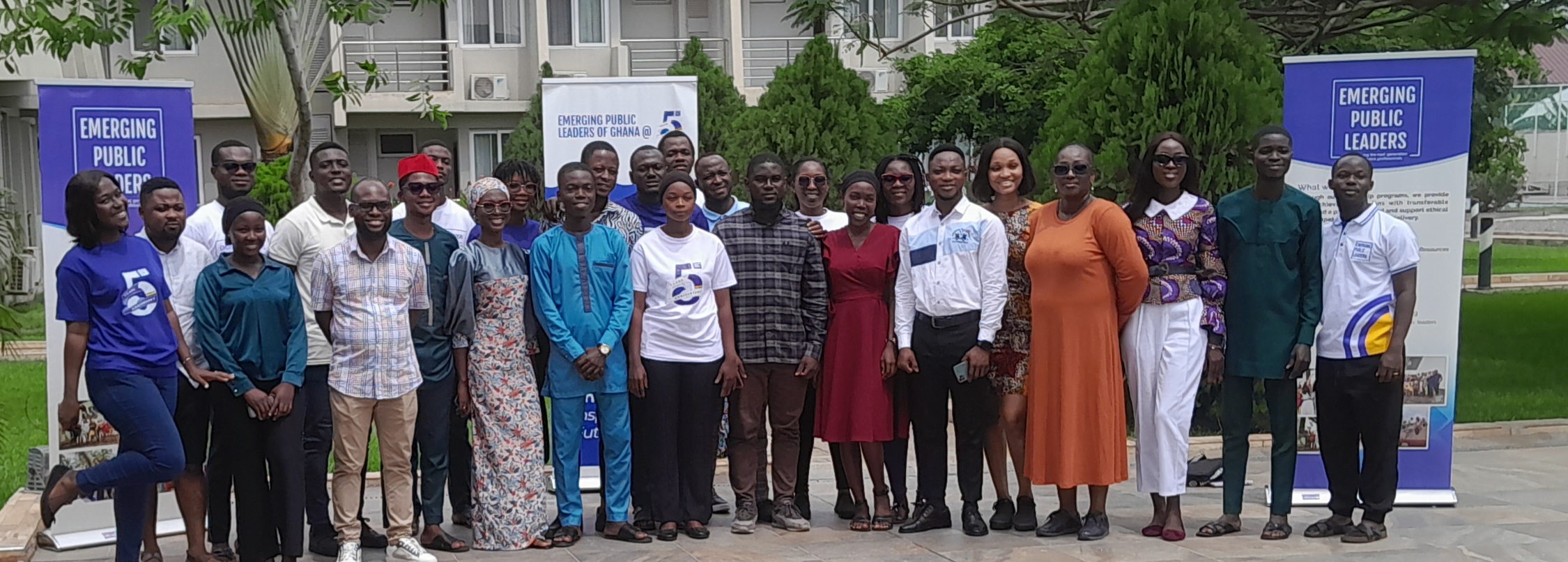
Abokobi, Greater Accra Region//-Emerging Public Leaders of Ghana (EPL Ghana), an organisation committed to empowering the next generation of public service professionals has held its three-day final training workshop for its fifth cohort of Public Service Fellowship.
The fellows numbering 25 were also assessed by the management of EPL Ghana on their community assessment report on the Volta River Authority’s induced Akosombo Dam spillage disaster which affected over 30 thousand people, several farms, houses, livelihoods and several communities. Several victims camped at Mepe and neighbouring communities in the North Tongu and South Tongu districts of the Volta Region.
The Gender Equity and Research Manager of EPL Ghana, Madam Efua Kwaambaa Turkson who led the team of EPL Ghana to train the fellows said: “The purpose of the workshop was in two phases. The first was to discuss the policy assessment and the report’s findings. The second was to enhance their capacity. As you have seen, they just had a session on how artificial intelligence (AI) impacts the public sector, among others”.
The team also took the fellows through some policies in Ghana’s public sector. They were further taught how to draft and implement workable policies to improve Ghanaian people’s lives.
The report
Throwing more light on the community assessment report conducted by the current fellows (cohort 5), she said the disaster occurred during the fellowship period, so EPL Ghana thought it wise to ask the fellows to undertake a comprehensive report on it.
Madam Turkson noted that the government had made some efforts to address the issues of Mepe and the other disaster-hit communities by providing water to the affected victims as well as access to other essential facilities.
She added that they went to the Mepe camp where there were shelters for the victims. Local and international NGOs also contributed a lot to ensure that the basic needs of the victims were somehow met.
Touching on the challenges, Madam Turkson said that there were a lot of challenges which needed urgent attention. The need for education and the livelihoods of the people were destroyed she said.
She was quick to add that food insecurity was identified. All these were some of the major challenges faced by the victims.
The fellows who went to the disaster area to conduct the report found out that the community’s involvement in the so-called simulation exercises and pre-activities was very low.
During the Beyond the Report discussions, the fellows brought out some interesting views. They wanted to address the issue of land ownership and utilisation. As it is in Ghana, individuals, families, and traditional authorities are owners of lands. So, when the government wants to undertake any development venture, it must first have to seek permission from the individuals or landowners before.
The community members were also reluctant to move to another area because of socio-cultural factors that made them victims of the disaster.
The final report of the community assessment would be given to the Volta Regional Coordinating Council, the two districts and other relevant institutions to show EPL Ghana and its fellow’s contribution to solving the disaster.
The fellows were the first to do policy assessment and engagement on the Mepe disaster aside from the donations and relief efforts by the state and non-state actors.
What next
The fellows will be graduating on the 16th of July this month at the British Council in Accra after a series of packed activities. One of them is the thought-leaders arena which is a policy debate among the fellows. They will be debating on the disaster this coming Saturday.
Facilitator’s encouragement
Taking the fellows through innovation and technology for the public sector, a facilitator of the workshop, Dr Vandyck Lomotey said as public leaders their innovation should be geared towards solving problems and creating opportunities for the people.
He urged them to use AI and other technologies to help address the challenges of the country’s public sector. With the use of AI, blockchains, automation and digitisation, the issue of corruption, delayed procurements, and other challenges could be solved, Dr Lomotey added.
Dr Lomotey who is also the Country Programs Director for Generation Ghana was of the view that after going to a training workshop, the fellows would go on to support Ghana as it transitions to becoming a solid country.
“Ghana has a great future. Looking at the young talented people that we have. It calls for intentional investment, mentorship, and providing them with the requisite support. This is not just a job for EPL Ghana, it is a job for everyone.
So, the invitation is being thrown out there that when you meet young persons the least you can do is to commit to support their growth. Because it is with these investments that we can see a better Ghana”, Dr Lomotey urged.
Fellows share experiences
Sharing their experiences as the cohort 5 fellows, Lawrence Nii Kotey Neequaye, the President of Cohort 5 said: “Generally the idea for me has been that I wanted to be part of fellowship not simply going through a recruitment agency.
With a recruitment agency, they help you to get a job. But what EPL Ghana has done is they did not just get us a job, but they brought us into a community of like-minded leaders where we get to learn from one another”.
As you can see, we are analysing data at this training session. So, it was not simply getting us to work. But every quarter, we have a training session where EPL Ghana gives us hands-on learning where we have instructors who are very vested in their fields. They join us, train us, and we take this back to the organisations that we find ourselves in.

So, how I benefitted is that I have a community of like-minded leaders across Ghana. Two I have gotten tangible trainings which are very critical in my personal development. I would have never dreamed of working at a public organisation like the Ghana Commodity Exchange, but for EPL Ghana in relationships with these public institutions, we are being able to find ourselves working in them”, Mr Neequaye said.
Deborah Nana Ama Abbey, another fellow of the year-long cohort 5 fellowship, said: “From the very beginning the process of recruitment was very meritocratic. It was a very detailed and thorough process for recruitment.
So, it made you feel like you made it and deserved where you are. But apart from that also the orientation process from the very beginning was very detailed. They (EPL Ghana) gave us training on public service, time management, and self-branding, among others”.
She continued: “So, they prepared us for the world of work including dealing with colleagues. They did not just put us out there to go and work with an organisation and left us alone. There are quarterly deep-dive trainings like the one we did today. We had training on communication, organogram, self-development and the one today on AI”.
So, you get to benefit professionally. We grow professionally, you grow your skill sets, and you also grow soft skills in addition. Even while you are at work, the monthly evaluations that are done help you to track the progress of what you are doing at your workplace and progress in terms of growth and new skills have you gained. You can even set a target for yourself. Because apart from they putting you out there to work, they also work help you to monitor your progress as well”.
Ms Abbey added that there was also a mentoring session as part of the 12-month fellowship. So, they paired the fellows with mentors who helped them personally, professionally levels and live goals, among others.
“So, the fellowship programme is amazing and all-encompassing, and the professional network that it opens you up to is a huge network”.
Benefits
Touching on the benefits of the fellowship to her, Ms Abbey indicated that the fellowship would enhance her work as a communication person. “For instance, today the session that we are going through for this deep dive where we are talking about AI, data protection, and cybersecurity, among others.
As a communications person, I work with a lot of data, because I collect data and find a very nice way to tell the story. AI has come and it is a new trend. So, it will help me to hone my skills in how to use AI to better my work as a communications person to visualise storytelling even in writing stories, among others. That is one part.”

She further explained: “The other part is also that even after the end of the 12-month fellowship, that is not where it ends. EPL Ghana has an alumni network that takes all of us in and they continue with the professional development. The alumni network opens you up to a lot of people in different professional cycles. It is going to benefit me professionally wide, and many more”.
Young people must apply
When asked whether she would advise other young people to apply to the next fellowship, Ms Abbey who is also the Communications Assistant at the West Africa Civil Society Institute (WACSI) smiled and she said would ask them to apply to the fellowship any day, and anytime.
“Because before I joined the fellowship, I didn’t know the reach of the civil society organisations (CSOs) world. I didn’t know how wide the CSOs’ world is. Some of us had the privilege of working with the CSOs. A few of my colleagues have worked with government agencies.
But I will advise anyone to apply because like I said professional development, personal development, and career development, but it also opens you up to a wide network of people. If you have any personal goals, you can even engage some of these networks and connections to build as well as build your professional goals. It opens you up to a world of opportunities.
The Public Service Fellowship
Instructively, the Public Service Fellowship (PSF) is EPL Ghana’s one-year flagship programme designed to equip young
graduates with competencies and capabilities across thematic areas required to thrive in public office.
The model incorporates components such as meritocratic recruitment; performance management with supervision; responsive training; community service projects; mentorship; and alumni engagement.
These components are designed to hone skills, attitudes, knowledge and understanding of public sector work to enable successful public service careers translating to good governance and nation-building.
20-35 fellows are accepted per cohort after which they join the fellowship programme alumni. It currently has 70 alumni.
Fellows and alumni are currently serving in over 34 public service and sector institutions across Ghana’s Central Government including the Ministry of Education; Ministry of Environment, Science, Technology and Innovation; Ministry of Foreign Affairs and Regional Integration; Ministry of Land and Natural Resources; Ministry of Finance; and Ghana Commodity Exchange.
Fellows are selected from all the 16 regions of Ghana.
According to data available to this publication, PSF-EPL Ghana attained a 57% increase in the proportion of females, demonstrating their commitment to gender diversity since the commencement of the fellowship programme.
65% of alumni work in civil service and are shaping policy and governance across various ministries and agencies. EPL Ghana also collaborated with 24 ministries and agencies, enhancing public administration nationwide.
The NGO also partnered with 10 public sector institutions, contributing to a wide public service delivery.
With 53% mentors from the public sector and 47% from the private sector, the fellows gain a comprehensive outlook from industry experts, equipping them to meet the dynamic demands of public service and drive efficient service delivery. Active participation in community service projects, instilling a sense of civic responsibility and social impact.


